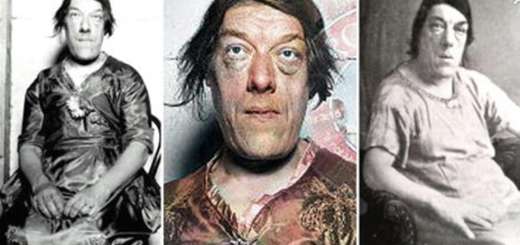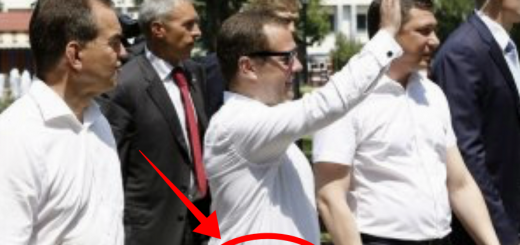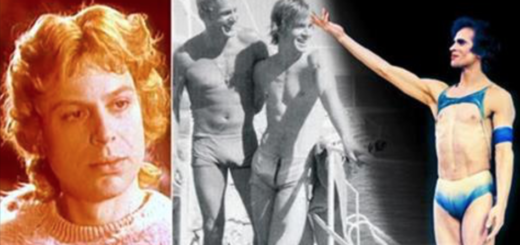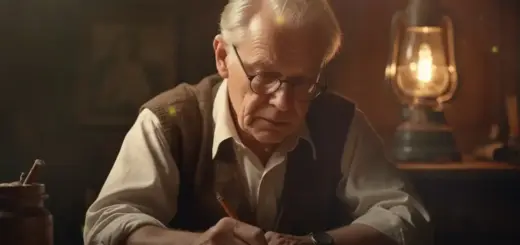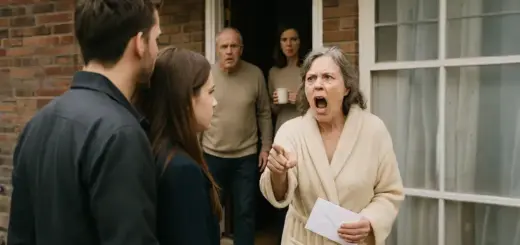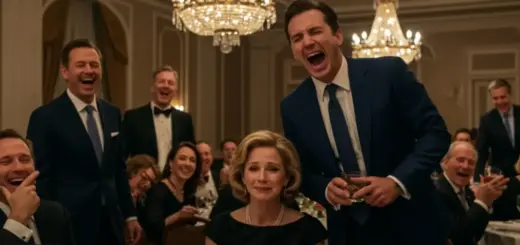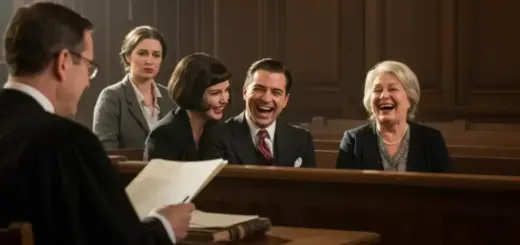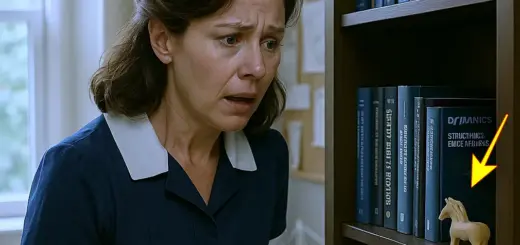The rain hammered against the windscreen as Margot Bellamy’s ancient Volkswagen spluttered up the gravel drive. She was two hours late. The funeral had been yesterday, a Tuesday she’d spent shelving returned books and helping Mrs. Patterson find large print mysteries. She hadn’t attended. Her father, Harold Bellamy, shipping magnate and notorious workaholic, wouldn’t have noticed her absence. He’d barely noticed her presence for the past 20 years. The Bellamy estate loomed before her, a Gothic monument to old money and older grudges.

Margot killed the engine and sat for a moment, watching the rain trace patterns down the glass.
She’d received the terse message from Theodore Pembroke, her father’s attorney, at seven that morning. «Presence required at will reading. 10 AM sharp. Do not be late.» She was late.
She was always late to everything that mattered to the Bellamys. Margot grabbed her worn satchel and darted through the downpour. The massive oak door opened before she could knock.
Theodore Pembroke stood in the doorway, his silver beard immaculate, his expression inscrutable behind wire-rimmed spectacles. «Miss Bellamy,» he said, his voice carrying decades of legal precision. «We’ve been waiting.»
«I’m sorry. I…»
«Come,» he turned without waiting for her explanation. The library was exactly as Margot remembered from childhood visits: all dark wood paneling and leather-bound books that nobody read. Seated in the high-backed chairs were the usual suspects.
Her stepmother, Patricia, was dabbing at dry eyes with a handkerchief. Uncle Desmond, Harold’s younger brother, was checking his phone with barely concealed impatience. And Victoria.
Victoria Bellamy sat like a queen holding court, her designer suit probably costing more than Margot’s monthly salary. At 35, Victoria was everything Margot wasn’t: polished, confident, and utterly ruthless.
She’d been Patricia’s daughter from a previous marriage, adopted by Harold when Margot was 12. From that day forward, Margot had become invisible.
«How kind of you to join us, Margot,» Victoria said, her smile sharp as cut glass. «We were just discussing how father always said punctuality was a sign of respect.»
Margot slid into the remaining empty chair, acutely aware of her damp cardigan and scuffed shoes. «I had work.»
«At the library,» Victoria said, making it sound like a particularly unpleasant disease. «How quaint.»
«Ladies,» Theodore interrupted, settling behind the massive mahogany desk. He opened a leather portfolio with deliberate care. «Shall we proceed?»
The reading was exactly what Margot expected. Uncle Desmond received a generous trust fund. Patricia got the London townhouse and a lifetime stipend. Victoria inherited the shipping company, Bellamy Maritime Holdings, worth an estimated 300 million pounds, along with the family’s investment portfolio and the fleet of properties across Europe.
Margot waited for her name. When Theodore finally said it, she felt everyone’s eyes turn toward her.
«And to my daughter, Margot Elizabeth Bellamy,» Theodore read, his voice carefully neutral, «I leave the remainder of my estate, including all personal effects, the contents of my private study, and the property known as Whitmore House, with all furnishings and belongings therein.»
The silence that followed was deafening.
«Whitmore House?» Victoria’s voice cracked with disbelief. «That crumbling ruin on the coast? Father hasn’t been there in decades.»
Theodore continued as if she hadn’t spoken. «Additionally, Miss Margot Bellamy is to receive the contents of safety deposit box 742 at Cootes Bank, London, to be accessed privately within 30 days.»
Margot’s mind reeled. Whitmore House was where she’d spent summers with her mother before the cancer took her. She was eight when they’d left for the last time, her mother too weak to climb the stairs. After her mother died, Harold had locked it up and never mentioned it again.
«This is absurd,» Victoria stood, her composure fracturing. «A derelict beach house, that’s what she gets.»
«The will is clear,» Theodore said.
Uncle Desmond snorted. «At least Harold had the sense to leave the real assets to someone competent.»
Margot felt the familiar sting of dismissal, but something else stirred beneath it: curiosity. Why Whitmore House? Why now? And what was in that safety deposit box?
«If there’s nothing else,» she said quietly, standing.
«Wait.» Theodore’s hand emerged from the portfolio holding a small envelope, yellowed with age. «Your father left specific instructions. This is for you alone.»
Margot took it, feeling the weight of everyone’s stares. Victoria’s eyes burned with suspicion.
Outside, the rain had stopped. Margot sat in her car and opened the envelope with trembling fingers. Inside was a key and a note in her father’s angular handwriting.
«Margot, forgive me. The truth is in the walls. -HB.»
She stared at the key, its brass worn smooth with age, and felt something shift in her chest. For 20 years, she’d been the forgotten daughter, the afterthought, the girl who chose books over boardrooms. But her father’s final words suggested she’d been wrong about everything. The forgotten daughter was about to remember.
Three months after the will reading, Margot stood in the marble halls of the Royal Courts of Justice, feeling like an imposter in her borrowed suit. The truth she’d discovered at Whitmore House had led her here, to this battlefield of legal warfare where Victoria wielded her father’s fortune like a weapon.
The lawsuit had arrived six weeks earlier: Victoria Bellamy versus Margot Bellamy, contest of testamentary capacity and undue influence. Victoria claimed their father had been mentally incompetent when he drafted his final will, manipulated by a daughter who’d suddenly reappeared after years of estrangement. It was a lie. But lies told with enough money behind them had a way of becoming truth.
«Miss Bellamy?» a woman’s voice cut through Margot’s spiraling thoughts. «I’m Judge Helena Cross. We’ll be convening in courtroom seven.»
Judge Cross was formidable: late 50s, steel-gray hair pulled back severely, eyes that missed nothing. Margot had researched her thoroughly.
Helena Cross had a reputation for cutting through pretense and despising manipulation. She was their best hope, though Owen Hastings, Victoria’s attorney, was a maestro at manipulation.
Inside the courtroom, Victoria sat beside Hastings, a portrait of wounded dignity. She’d dressed in understated black, playing the grieving daughter robbed of her rightful inheritance. Hastings was a predator in Savile Row tailoring, his smile practiced and empty.
Margot’s attorney, a young solicitor named Rebecca Walsh, whom she could barely afford, looked nervous. They were outgunned and everyone knew it.
«All rise,» the clerk announced. Judge Cross swept in, her robes billowing. «Be seated. Mr. Hastings, you may present your opening statement.»
Hastings stood with theatrical grace. «Your Honor, this case concerns a vulnerable elderly man, Harold Bellamy, who in his final months was systematically isolated and manipulated by a daughter who had abandoned him for two decades: Miss Margot Bellamy.»
He gestured toward her with barely concealed contempt. «She reappeared only when her father’s health declined, exploiting his loneliness and cognitive decline to alter his will dramatically.»
Margot’s hands clenched in her lap. Every word was calculated poison.











